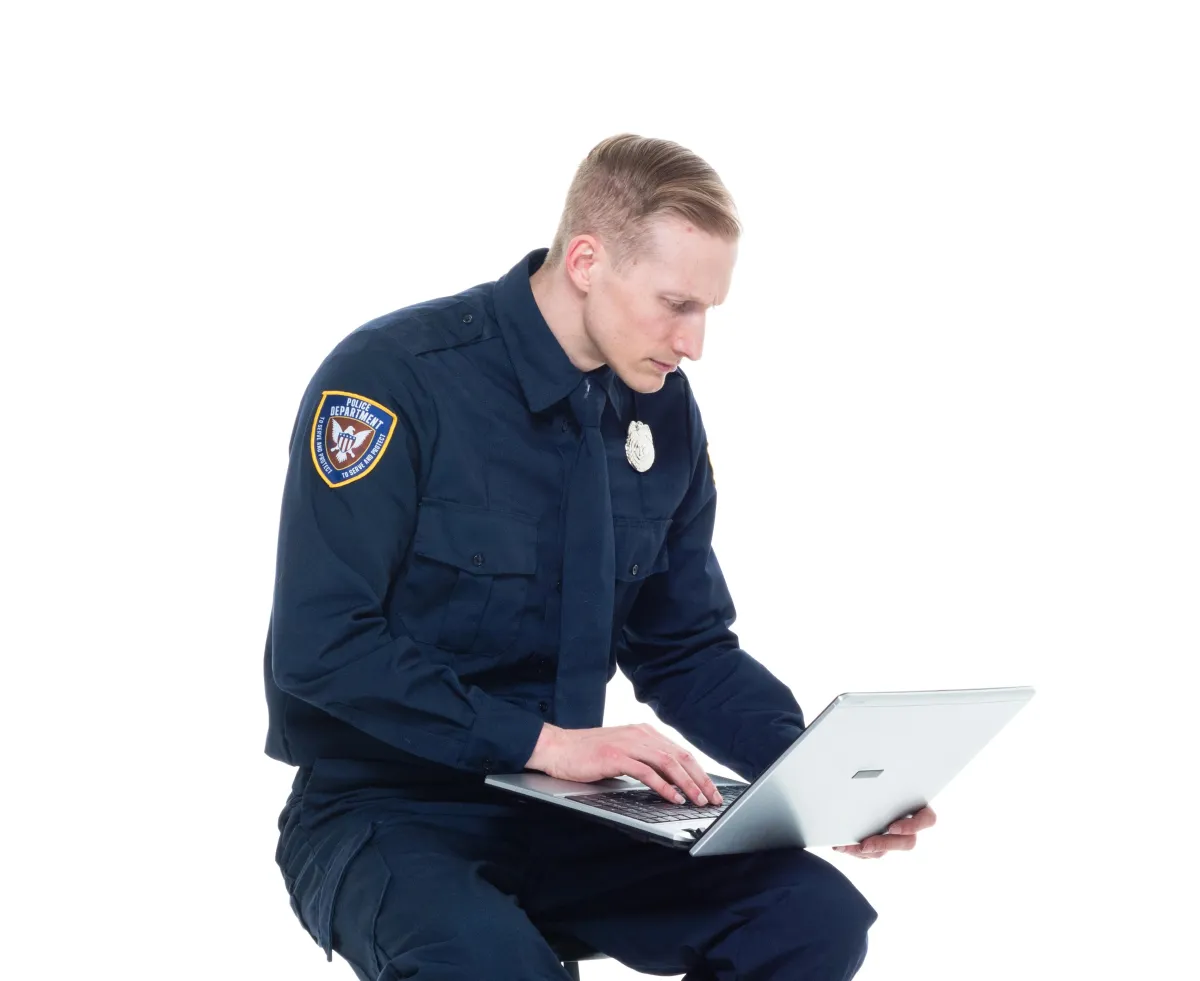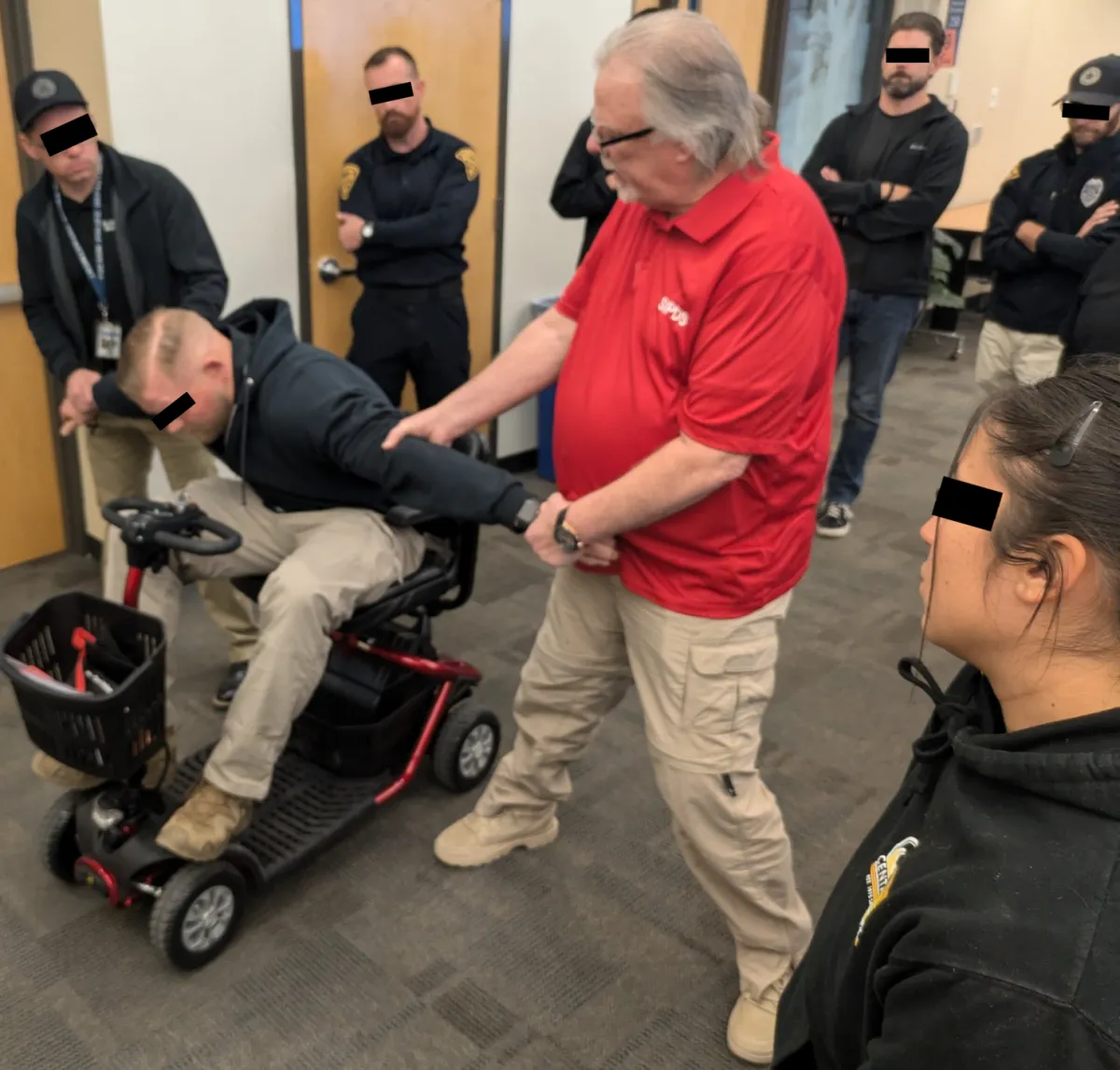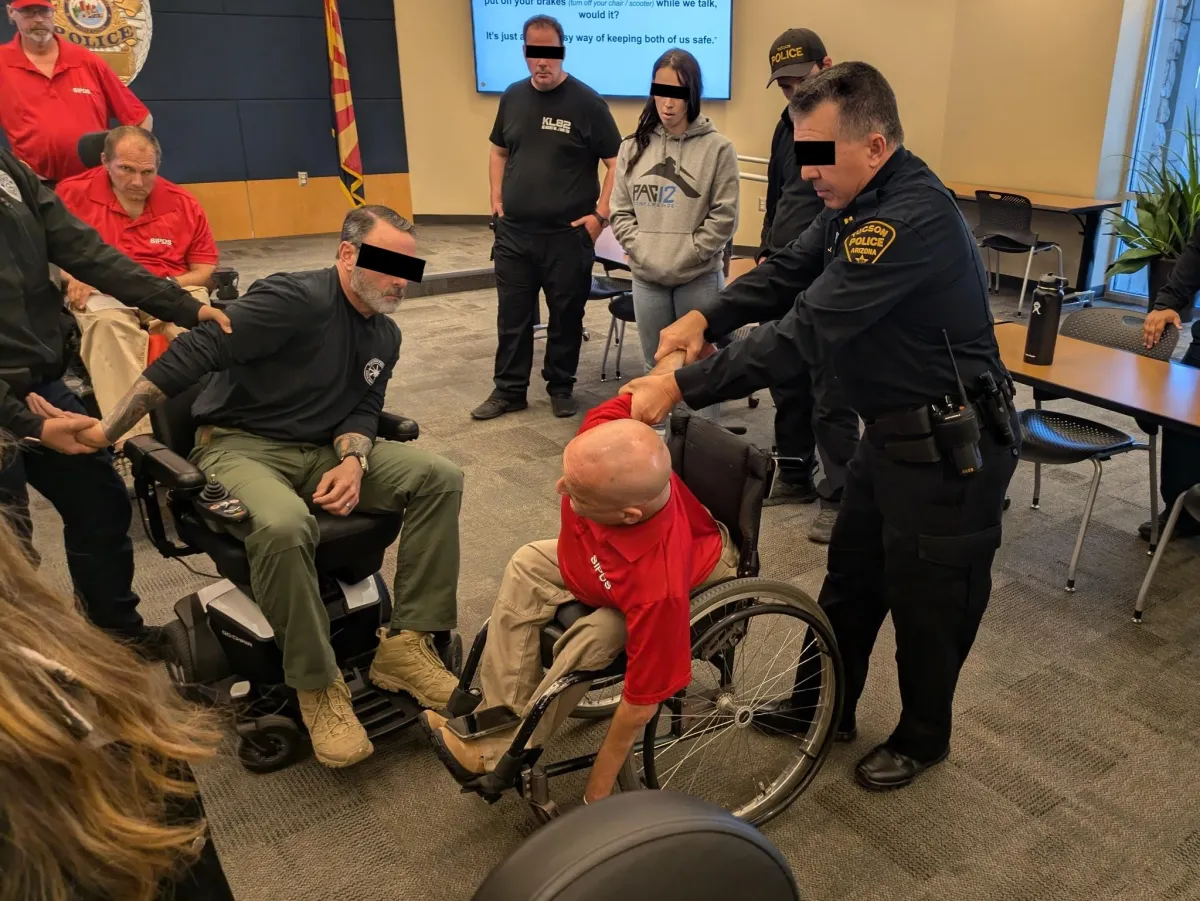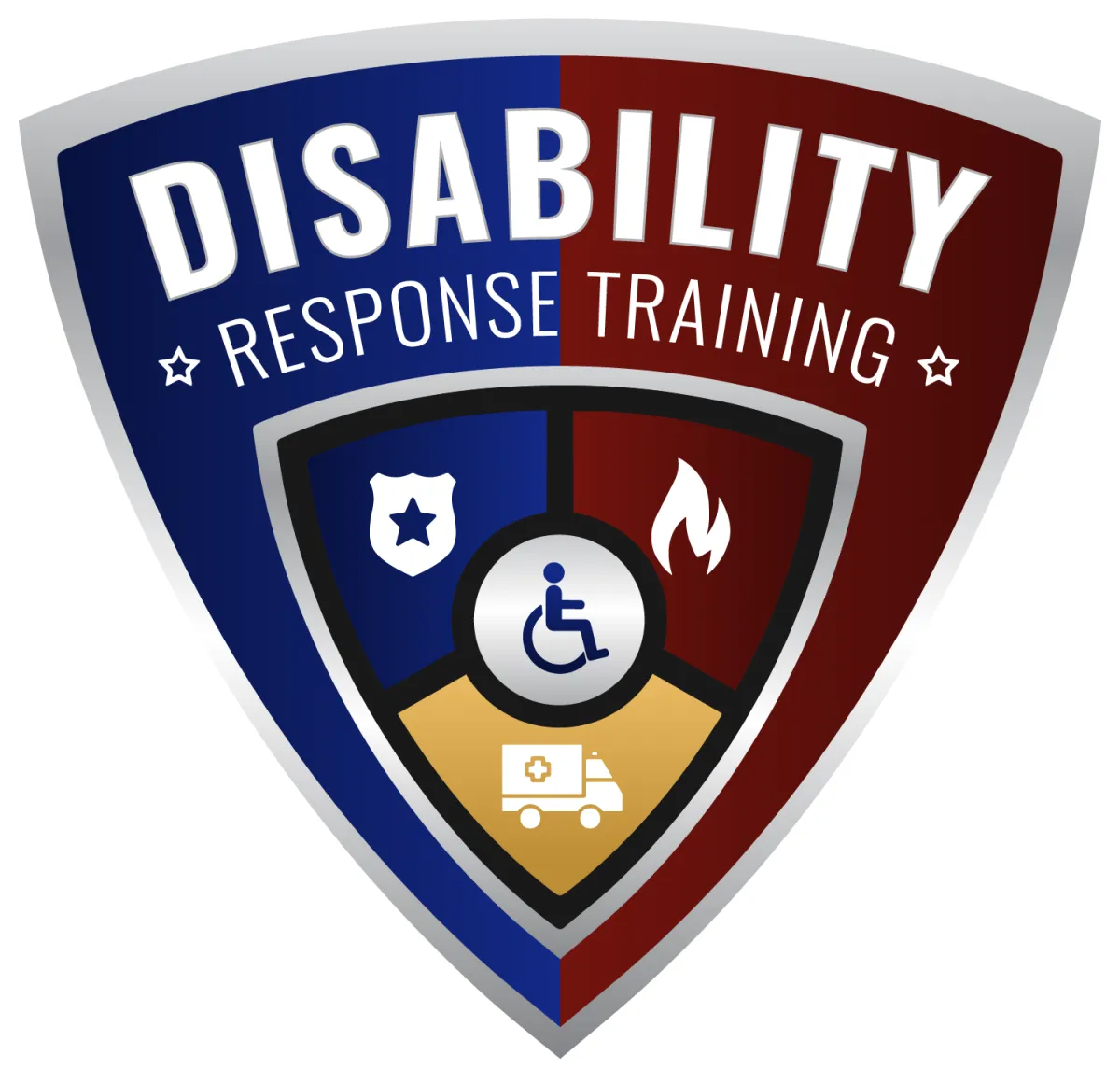Transforming Law Enforcement Through Specialized Training
Preparing Officers for Today's Challenges
Disability Response Training: Elevating Law Enforcement Standards
Why This Training Matters
Nowadays, modern policing demands more than authority and a show of strength—it requires compassion, precision, and the ability to navigate complex interactions with vulnerable populations. Physically disabled suspects (PDS) present unique challenges—and traditional police training often falls short in preparing officers for these encounters, especially as these interactions are becoming increasingly more frequent.
At Disability Response Training (DRT), we bridge this critical gap by equipping law enforcement with the skills and knowledge they need to:
Protect lives through safe, field-tested methods.
Strengthen public trust with dignified, ethical practices.
Mitigate liability by exceeding legal and professional standards.
Boost officer confidence and department credibility with cutting-edge techniques.
Our training doesn’t just improve outcomes—it transforms the way officers approach every interaction, ensuring safety, respect, and professionalism at all times.
This comprehensive training prepares officers with the skills and confidence to effectively interact with individuals who have physical disabilities. From understanding the various types of disabilities, mobility devices, and potential hiding places to mastering de-escalation, control, cuffing, and advanced search techniques, our programs thoroughly prepare officers for effective engagement with physically disabled suspects.
Departments implementing our training are thrilled with the outcome and are sending a clear message—they are committed to professionalism, accountability, and community trust in a world where interactions between police and physically disabled suspects are becoming increasingly common and complex.
Success Stories from Our Partners!
Limores, Detective
7.5 Years on the Force
Tucson Police Department

“So Great! I can't believe this hasn't already been designated as mandated training; it should be everywhere! I loved it!”
Roebke, Patrol
7 Years on the Force
Tucson Police Department

“This training should be mandatory for all sworn staff! Understanding the mindset and psychology of disabled people is very valuable.”
Romero, Patrol
5 Years on the Force
Tucson Police Department

“Loved the training! I recommend all LEOs attend; it would be beneficial for more departments to buy into this training!"
DRT Training Programs

Option 1
Foundations in Disability Response
Prepare your officers with essential knowledge using unlimited, on-demand access to our comprehensive Disability Response Training video series for one year. Our video training programs introduce officers to fundamental concepts and skills necessary for safely engaging with individuals who have physical disabilities.
This program ensures all officers are prepared to handle these situations with empathy, awareness, and professionalism.
Disability Response Training offers comprehensive expertise in three critical areas:
Familiarization with Physical Disabilities and Mobility Devices
Control and Cuffing Techniques
Lifting and Searching Methods
Departments can choose with flexibility the specific training that fits their needs: purchase one video training set focused on a single area, or select two and receive the third at no additional cost.
This online program is perfect for departments looking to integrate essential training at their own pace. It ensures your department has the foundational tools to build awareness and confidence when safely interacting with physically disabled suspects.
Affordable Access to Essential Training: Gain unlimited access to our expertly crafted training videos for one full year. This cost-effective option allows departments of any size to provide officers with the foundational knowledge needed to interact safely and effectively with physically disabled suspects.
Flexible Learning Anytime, Anywhere: Officers can complete training at their own pace, making it easy to integrate into busy schedules without disrupting department operations. This flexibility ensures all team members receive consistent and reliable instruction.
Comprehensive Curriculum for Immediate Application: The video series covers the essentials, including: disability and mobility device familiarization, control and cuffing techniques, and lifting and searching methods. Officers can immediately apply what they’ve learned in the field, increasing confidence and reducing risk.
Strengthen Department Safety and Public Trust: Providing foundational training demonstrates your department’s commitment to accountability and community trust. This proactive approach enhances officer safety and builds credibility with the communities you serve.

Option 2
Train-the-Trainer Advantage
For departments seeking deeper understanding and more practical experience for their officers—our Train-the-Trainer Advantage program empowers your department with in-house expertise; this means your trainers will have all the instructional tools needed to deliver this critical training to your officers.
This package licenses your team to deliver our proven methods directly to your officers for one year. You receive unlimited video training access for your entire department and a 3-day, immersive Train-the-Trainer program for your training staff.
BONUS: Our experts fly to your city to personally train your academy cadets, setting the foundation for excellence.
Train-the-Trainer Advantage offers comprehensive expertise in all three critical areas:
Familiarization with Physical Disabilities and Mobility Devices
Control and Cuffing Techniques
Lifting and Searching Methods
Empower your department to lead the way in Disability Response Training.
Scalable Expertise for Your Entire Department: Empower your trainers with the knowledge and skills to teach Disability Response Training across your agency. By equipping your team with expert instruction, you ensure consistent, high-quality training for all officers, year-round.
Cost-Effective, Long-Term Training Solution: With one investment, your department gains unlimited access to all video training materials and the ability to license our curriculum for internal use. This approach maximizes your training budget while maintaining program integrity and continuity.
Hands-On Mastery for Department Trainers: Your trainers will attend an intensive three-day session to gain a deep understanding into the psychology of physically disabled suspects, personally experience the strengths and weaknesses attributed to different disabilities, enhance their approach protocol, practice stopping mobility devices and breaking them down for transportation, identify common and uncommon hiding places, and master de-escalation techniques, control and cuffing methods, and advanced lifting and searching procedures. This fully comprehensive training enhances your staff's ability to confidently instruct others and tailor sessions to meet department-specific needs.
Immediate Impact with On-Site Cadet Training: As part of this package, our team of experts will travel to your location to train police academy cadets directly. This ensures new officers receive the most comprehensive, real-world training that prepares them for the increasing complexities of modern law enforcement.

Option 3
Department Mastery in
Disability Response
When precision matters most—bring our experts directly to your department.
Level 3: Department Mastery in Disability Response is our premier, in-person training solution, led by the founder and creator of Disability Response Training. This program delivers immersive, hands-on instruction tailored to your agency’s unique needs, ensuring your officers are fully prepared to handle the complexities of engaging with physically disabled suspects.
Experience the ultimate training solution with real-world scenario exercises and direct coaching from seasoned professionals. Your officers will gain mastery in:
Familiarization with Physical Disabilities and Mobility Devices
Control and Cuffing Techniques
Lifting and Searching Methods
This training goes beyond the basics, fully empowering your team to respond confidently, effectively, and respectfully in every situation.
By investing in Level 3: Department Mastery in Disability Response, your department demonstrates an unwavering commitment to excellence and accountability.
This elite training enhances officer safety and preparedness, strengthens public trust, and elevates your department’s reputation as a leader in progressive and inclusive policing.
Direct Access to the Industry’s Leading Expert: Transform your department with elite-level training. Bring the ultimate solution to your department by having the founder and creator of Disability Response Training lead in-person instruction. This unparalleled opportunity ensures officers gain the highest level of expertise from the industry’s foremost authority. This hands-on instruction is tailored specifically to your department and your officers' unique needs.
Mastery Through Immersive, Real-World Learning: Officers experience intensive, live training that replicates the complexities of engaging with physically disabled suspects. All trainees gain a deep understanding into the psychology of physically disabled suspects, personally experience the strengths and weaknesses attributed to different disabilities, enhance their approach protocol, practice stopping mobility devices and breaking them down for transportation, identify common and uncommon hiding places, and master de-escalation techniques, control and cuffing methods, and advanced lifting and searching procedures. This immersive and fully comprehensive training builds confidence and ensures readiness for complex situations.
Tailored Solutions for Unique Department Needs: We adapt our training to reflect the specific challenges your department faces, providing a custom-fit approach that addresses your community's demographics, geography, and operational demands. This personalized strategy ensures officers are ready for any situation, which guarantees practical and actionable results immediately.
Unmatched Commitment to Excellence: Investing in Level 3 signals your department’s unwavering commitment to professional growth and public trust. This elite program enhances officer safety, strengthens public trust, and solidifies your department as a leader in law enforcement best practices.
Listen to James Malinchak's Endorsement of
P.J. Dixon, Founder of Disability Response Training
James Malinchak, Star of ABC's Hit TV Show, Secret Millionaire
What Makes Disability Response Training Essential?
Bridging a Critical Training Gap: Traditional law enforcement training rarely addresses the specific challenges of interacting with physically disabled suspects. Disability Response Training fills this gap, preparing officers with the skills they need to handle these encounters professionally and safely.
Responding to a Growing Reality: With an increasing number of interactions between law enforcement and individuals with disabilities, this training ensures officers are prepared for the unique demands of modern policing. Being unprepared risks compromising safety, dignity, and legal compliance.
Protecting Departments from Liability: Improper handling of physically disabled suspects can lead to lawsuits, negative press, and erosion of public trust. This training mitigates those risks by instilling best practices for ethical, respectful, and effective responses.
Field-Tested: These techniques have been developed for real-world situations and proven—with overwhelming success—to be both practical and easy to implement. Officers complete this training with instantly applicable techniques that work and improve situational optics.
Empowering Officers with Confidence and Precision: Uncertainty in high-pressure situations leads to mistakes. By mastering the physical, procedural, and psychological aspects of engaging with physically disabled suspects, officers gain both confidence and skill—effectively reducing hesitation and ensuring decisive, lawful actions.
Comprehensive Skillsets: Officers gain practical knowledge, including advanced search protocols, solo and partnered arrest techniques, and communication strategies that protect both rights and safety.
Empathy Meets Expertise: We teach officers how to handle sensitive areas like prosthetics and medical devices with care and respect, balancing tactical efficiency with human dignity.
Setting a Higher Standard for Policing: Disability Response Training demonstrates a department’s commitment to inclusion, respect, and accountability. It sets your agency apart as a leader in progressive policing, strengthening community relationships, and enhancing public trust.
Success Stories from Our Partners!
R. Berra, Patrol
Tucson Police Department

“Awesome! Highly informative and funny, making it all the better. Good balance of hands-on and classroom.”
N. Wade, Patrol
Tucson Police Department

“This training is great, relevant, and usable in everyday patrol. This would've been great years ago!”
C. Nichols, Patrol
Tucson Police Department

“Very useful! Full of actionable information I can use. Keep doing what you're doing! Thank You!”
ATTENTION
According to the Department of Justice (DOJ) and the International Association of Chiefs of Police (IACP), law enforcement agencies must be prepared to interact effectively with individuals with disabilities.
And while the Americans with Disabilities Act (ADA) doesn't explicitly state that law enforcement agencies "must have training"—the DOJ and IACP both strongly recommend and advocate for training—specifically because training is recognized as a key tool to ensure compliance and reduce risk.
DOJ Guidance and Requirements:
ADA Title II Compliance: public entities, including police departments, must provide services in a manner that does not discriminate against individuals with disabilities. This includes ensuring reasonable accommodations are made during interactions.
Q: Do your officers know what "reasonable accommodations" to provide depending on the nature of the person—and/or suspect's—physical disability?
Q: Does your department have clearly-stated, specific expectations for your officers when it comes to engagement with physically disabled suspects (PDS)?
Reasonable Modifications: the DOJ specifically highlights the need for “reasonable modifications of policies, practices, or procedures” to avoid discrimination—according to the DOJ, training is often the most practical way to ensure officers can identify disabilities and provide these modifications effectively.
Q: Does your department have any "reasonable [and specific] modifications of your policies, practices, and/or procedures" when it comes to your officers successfully interacting with PDS?
Q: Do your officers have any training as it relates to identifying specific physical impairments and the disabled person's corresponding strengths, weaknesses, and probable mindset?
Effective Communication (§ 35.160): departments must ensure their officers can communicate effectively with disabled individuals, which includes—but is not limited to—those who are deaf, blind, or have cognitive or mental health challenges. The DOJ’s stance is that training is critical to achieving effective communication and reducing misunderstandings that could escalate encounters unnecessarily.
Q: Are your officers skilled in effectively communicating with a PDS who is displaying any of the three signs of "disabled anger and arrogance"—or its corresponding truths? If not, what is their plan for de-escalation?
Q: How is your department ensuring your officers receive this training?
Case Law and Settlements: in various enforcement actions, the DOJ has required departments to implement specific training on disability interactions as part of consent decrees or settlement agreements when failures have occurred.
Q: Are your officers truly prepared to successfully interact with physically disabled suspects—and their different mobility devices? Are they trained in lifting, searching, and transporting a PDS and their equipment?
Q: Is your department prepared—or could the DOJ get involved with the operations of your department, if an encounter with a physically disabled person (PDP) goes wrong?
IACP Strongly Advocates for specific training to equip officers with the skills to:
Recognize Disabilities: officers must be able to successfully identify signs of physical, cognitive, or mental health disabilities to avoid misinterpretation (e.g., confusing disability symptoms with non-compliance or intoxication).
Q: Do your officers know what to look for when it comes to "invisible" physical disabilities—so as to avoid misinterpretation in these encounters, also—or just cognitive and mental health disabilities?
De-escalate Situations: train officers to use alternative strategies for individuals whose disabilities may lead to non-traditional behavior, such as sensory sensitivities or difficulty understanding commands.
Q: Are your officers trained in body-positioning and effective language models to reduce agitation and de-escalate situations involving a physically disabled suspect?
Adapt Communication Techniques: equip officers to interact with people who may use sign language, assistive devices, or simplified communication.
Q: Do your officers know the simplest way to adapt communication with someone they cannot understand due to severe verbal restrictions—and cannot write or use an assistive device because they have uncontrollable spasticity?
Avoid Unnecessary Use of Force: training emphasizes understanding a disabled person's thoughts and corresponding behaviors, reducing the likelihood of an inadvertent misjudgment, which may lead to excessive force or wrongful arrests.
Q: Do your officers understand the general psychology of people with physical disabilities?
Q: Are your officers aware of how PDP think and feel about themselves due to their disability, see themselves compared to normal, able-bodied people, and how blind authority can trigger them?
The combined effect of DOJ requirements and IACP best practices creates a strong implication—and, in some cases, a direct mandate—that departments must provide specific training.
While most departments get some form of "mental health crisis" training, it is limited to emotional and cognitive disorders. And as such, this training is incomplete because it fails to address how LEO can successfully interact with physically disabled people and suspects—like many in the homeless population . This oversight leaves law enforcement with blind spots—and leads to misunderstandings, escalated encounters, and possible compliance issues with the ADA.
Without proper training, departments and their officers risk legal liability, public distrust, and preventable harm.
Disability Response Training (DRT) is the first and only program of its kind—designed to equip officers with the skills and knowledge to bridge these gaps. This training ensures your department meets today’s challenges head-on while safeguarding your officers, your community, and your department's reputation.
DRT isn’t just another program—it’s the solution your department needs to meet the growing challenges of modern law enforcement.
Ready to Transform Your Department’s Approach?
Contact us today to learn more about our training programs—and how we can customize them to suit your department’s specific needs.
Empowering Law Enforcement to Successfully Interact with Physically Disabled Suspects
Essential training to prepare your officers for any situation involving a physically disabled person—boosting individual safety and reinforcing public trust.
Contact:
© 2025 Disability Response Training
All Rights Reserved - Privacy Policy
